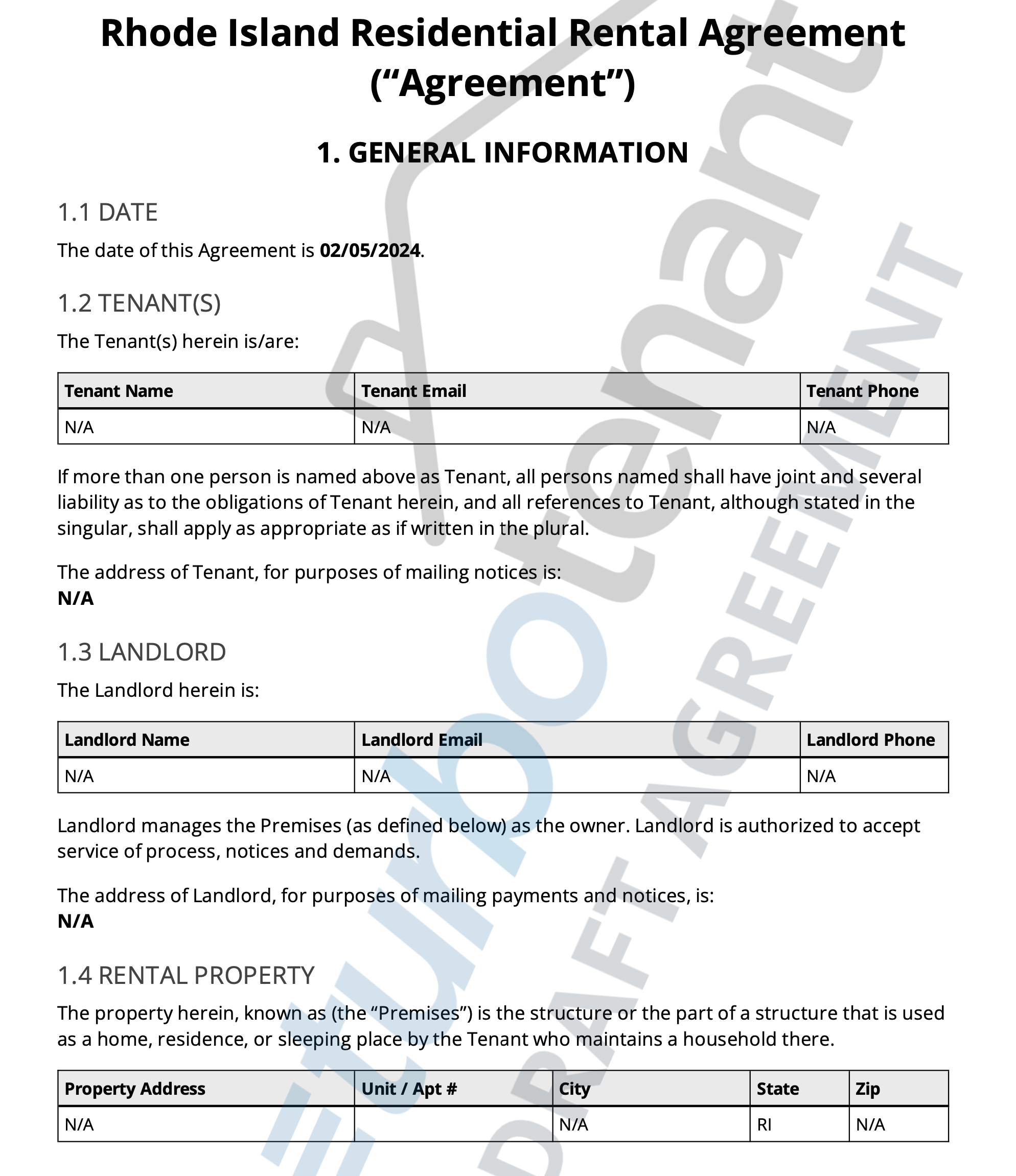
When drafting lease agreements in Rhode Island, it’s crucial that they are customized to meet the specific legal requirements of the state, as well as the individual needs of the landlord and tenant. TurboTenant’s Lease Agreement Generator and Templates provide landlords with a convenient and reliable tool to ensure their lease agreements are legally sound and tailored to their rental properties.
Customized Leased Agreement
The initial section is designed for landlords to input the details that are unique to their rental situation. This includes information such as who is on the lease, the rent amount, and utility arrangements. All these details are summarized at the beginning of the agreement for easy reference.
Key Customizable Elements
- Additional Provisions: Allows landlords to include property-specific rules or necessary local clauses.
- Lost Key Policy (Section 1): Stipulates that tenants must pay for the full cost of rekeying if all keys are not returned at the end of the tenancy.
Specific to Rhode Island
This section is crafted with mandatory clauses that adhere to Rhode Island’s state laws, ensuring compliance. Through the use of our Advance Editor feature, you can change the terms of the provisions, but caution is suggested as editing these provisions may bring the lease out of legal compliance with state and local laws. Consulting with your attorney is always suggested to remain legally compliant. Notable Rhode Island Regulations
- Late Fees (Section 2.1): Rent is considered late if not paid by the 5th day of the month, allowing landlords to charge a late fee of 5% of the unpaid rent.
- Security Deposit Provisions (Section 2.4): Rhode Island restricts security deposits to one month’s rent, with certain exceptions for furnished apartments. Landlords have 20 days to return the security deposit after the lease ends.
- Entry/Access to Premises by Landlord (Section 2.8): Landlords have the right to enter the property for various reasons and must attempt to notify the tenant two days in advance in non-emergency situations.
- Absences (Section 2.9): Tenants must notify landlords of absences exceeding ten days and arrange for property checks during this time.
- Non-Resident Landlord to Designate Agent (Section 2.15): Out-of-state landlords must designate a local agent for service of legal notices and file this information with the relevant authorities.
General Clauses for Best Practices
Section 3 contains clauses that are generally standard across lease agreements, ensuring that the lease adheres to best practices in landlord-tenant relationships.
Key General Clauses
- Subletting (Section 3.1): Tenants are prohibited from subleasing without written permission from the landlord.
- Altering or Improving the Property (Section 3.2): Requires tenants to obtain written consent before making any alterations and to return the property to its original condition upon moving out.
- Choice of Law (Section 3.11): The lease agreement is governed by Rhode Island law, and any legal proceedings must take place in the county courts where the property is located.
- Follow the Law (noise, drugs, etc.) (Section 3.14): Tenants must abide by all laws and ordinances and avoid being a nuisance to neighbors.

FAQ
What can I include in the Additional Provisions of the lease agreement?
In the Additional Provisions section, you can add any property-specific rules, necessary local clauses, or other specifics you want to include. However, it’s recommended to review these additional provisions with a lawyer to ensure they comply with local laws.
How much can I charge for a late fee in Rhode Island?
If rent is not paid by the 5th day of the month, Rhode Island law permits landlords to charge a late fee equal to 5% of the unpaid rent amount.
What are the rules for security deposits in Rhode Island?
Rhode Island limits security deposits to one month’s rent, with an exception for furnished apartments that may require an additional month’s rent if the furniture’s value exceeds $5,000.
Can I enter the rental property for inspections or repairs?
Yes, landlords in Rhode Island have the right to enter the rental property for inspections, repairs, or showings. In non-emergency situations, landlords should make an effort to notify the tenant at least two days in advance.
What if I am a non-resident landlord in Rhode Island?
Non-resident landlords must designate a local agent for service of legal notices, such as minimum housing code violations. The agent’s details must be filed with the secretary of state and the local city or town clerk.
TurboTenant Rhode Island Lease Agreements
TurboTenant’s tools assist Rhode Island landlords in creating lease agreements that are not only compliant with state laws but also include best practices for a seamless landlord-tenant relationship. By using TurboTenant’s resources, you can ensure that your lease agreements provide a solid foundation for your rental business, with customizable options to meet your specific needs.
Rhode Island Resources


